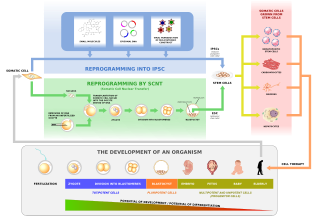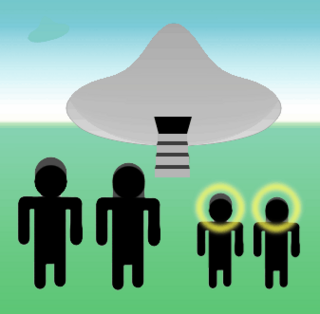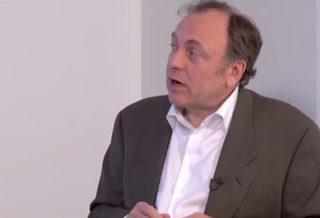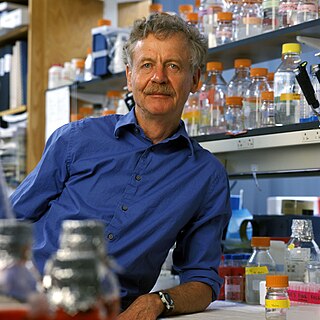
Human cloning is the creation of a genetically identical copy of a human. The term is generally used to refer to artificial human cloning, which is the reproduction of human cells and tissue. It does not refer to the natural conception and delivery of identical twins. The possibility of person cloning has raised controversies. These ethical concerns have prompted several nations to pass laws regarding human cloning and its legality.

Clonaid is a Canadian-based human cloning organization, registered as a company in the Bahamas. Founded in 1997, it has philosophical ties with the UFO religion Raëlism, which sees cloning as the first step in achieving immortality. On December 27, 2002, Clonaid's chief executive, Brigitte Boisselier, claimed that a baby clone, named Eve, was born. Media coverage of the claim sparked serious criticism and ethical debate that lasted more than a year. Florida attorney Bernard Siegel tried to appoint a special guardian for Eve and threatened to sue Clonaid, because he was afraid that the child might be treated like a lab rat. Siegel, who heard the company's actual name was not Clonaid, decided that the Clonaid project was a sham. Bioethicist Clara Alto condemned Clonaid for premature human experimentation and noted the high incidence of malformations and thousands of fetal deaths in animal cloning.

In genetics and developmental biology, somatic cell nuclear transfer (SCNT) is a laboratory strategy for creating a viable embryo from a body cell and an egg cell. The technique consists of taking an enucleated oocyte and implanting a donor nucleus from a somatic (body) cell. It is used in both therapeutic and reproductive cloning. In 1996, Dolly the sheep became famous for being the first successful case of the reproductive cloning of a mammal. In January 2018, a team of scientists in Shanghai announced the successful cloning of two female crab-eating macaques from fetal nuclei.
S1909/A2840 is a bill that was passed by the New Jersey Legislature in December 2003, and signed into law by Governor James McGreevey on January 4, 2004, that permits human cloning for the purpose of developing and harvesting human stem cells. Specifically, it legalizes the process of cloning a human embryo, and implanting the clone into a womb, provided that the clone is then aborted and used for medical research. The legislation was sponsored by Senators Richard Codey (D-Essex) and Barbara Buono, and Assembly members Neil M. Cohen (D-Union), John F. McKeon, Mims Hackett (D-Essex), and Joan M. Quigley (D-Hudson). The enactment of this law will enable researchers to find cures for debilitating and deadly diseases.

Michael D. West is a biogerontologist, and a pioneer in stem cells, cellular aging and telomerase. He is the founder and CEO of AgeX Therapeutics, a startup focused on the field of experimental gerontology.

Proposition 71 of 2004 is a law enacted by California voters to support stem cell research in the state. It was proposed by means of the initiative process and approved in the 2004 state elections on November 2. The Act amended both the Constitution of California and the Health and Safety Code.
Gerald Schatten is an American stem cell researcher with interests in cell, developmental, and reproductive biology. He is Professor and Vice-Chair of Obstetrics, Gynecology and Reproductive Sciences and Professor of Cell Biology and Physiology at the University of Pittsburgh, where he is also Director of the Division of Developmental and Regenerative Medicine at the university's School of Medicine. Additionally, he is Deputy Director of the Magee-Womens Research Institute and Director of the Pittsburgh Development Center.
Gregory Stock is a biophysicist, best-selling author, biotech entrepreneur, and the former director of the Program on Medicine, Technology and Society at UCLA’s School of Medicine. His interests lie in the scientific and evolutionary as well as ethical, social and political implications of today's revolutions in the life sciences and in information technology and computers.

Lori B. Andrews is an American professor of law. She is on the faculty of Illinois Institute of Technology Chicago-Kent College of Law and serves as Director of IIT's Institute for Science, Law, and Technology. In 2002, she was a visiting professor at Princeton University. She received her B.A. summa cum laude from Yale College and her J.D. from Yale Law School. Andrews is a Fellow of the Hastings Center.

Rudolf Jaenisch is a Professor of Biology at MIT and a founding member of the Whitehead Institute for Biomedical Research. He is a pioneer of transgenic science, in which an animal’s genetic makeup is altered. Jaenisch has focused on creating genetically modified mice to study cancer and neurological diseases.
Rosario Isasi is a health and human rights attorney, whose research and work focuses on the regulation of human genetic technologies.
The Center for Genetics and Society (CGS) is a nonprofit information and public affairs organization, based in Berkeley, California, United States. It encourages responsible use and regulation of new human genetic and reproductive technologies.
Stem cell research policy varies significantly throughout the world. There are overlapping jurisdictions of international organizations, nations, and states or provinces. Some government policies determine what is allowed versus prohibited, whereas others outline what research can be publicly financed. Of course, all practices not prohibited are implicitly permitted. Some organizations have issued recommended guidelines for how stem cell research is to be conducted.
Alan Osborne Trounson is an Australian embryologist with expertise in stem cell research. Trounson was the President of the California Institute for Regenerative Medicine between 2007 and 2014, a former Professor of Stem Cell Sciences and the Director of the Monash Immunology and Stem Cell Laboratories at Monash University, and retains the title of Emeritus Professor.

Raëlian beliefs and practices are the concepts and principles of Raëlism, a new religious movement and UFO religion founded in 1974 by Claude Vorilhon, a former French auto racing journalist who changed his name to "Raël". The followers of the International Raëlian Movement believe in an advanced species of extraterrestrial aliens called Elohim who created life on Earth. Raëlians are individualists who believe in sexual self-determination. As advocates of the universal ethic and world peace, they believe the world would be better if geniuses had an exclusive right to govern in what Rael terms Geniocracy. As believers of life in outer space, they hope that human scientists will follow the path of the Elohim by achieving space travel through the cosmos and creating life on other planets. As believers in the resurrection of Jesus Christ through a scientific cloning process by the Elohim, they encourage scientific research to extend life through cloning, however critics outside are doubtful of its possibility.
Royan Institute is an Iranian clinical, research and educational institute dedicated to biomedical, translational and clinical researches, stem cell research and infertility treatment. It is a public non-profitable organization affiliated to Academic Center for Education, Culture and Research. It was established in 1991 by the late Dr. Saeid Kazemi Ashtiani as a research institute for Reproductive Biomedicine and infertility treatments. In 1998 this institute was approved by Ministry of Health as Cell Based Research Center with over 46 scientific members and 186 lab technicians.
Stem cell laws are the law rules, and policy governance concerning the sources, research, and uses in treatment of stem cells in humans. These laws have been the source of much controversy and vary significantly by country. In the European Union, stem cell research using the human embryo is permitted in Sweden, Spain, Finland, Belgium, Greece, Britain, Denmark and the Netherlands; however, it is illegal in Canada, Germany, Austria, Ireland, Italy, and Portugal. The issue has similarly divided the United States, with several states enforcing a complete ban and others giving support. Elsewhere, Japan, India, Iran, Israel, South Korea, China, and Australia are supportive. However, New Zealand, most of Africa, and most of South America are restrictive.
Stem cell laws and policy in the United States have had a complicated legal and political history.
HumGen.org is the website of the Centre for Genomics and Policy, which is affiliated with McGill University and the Génome Québec Innovation Centre in Canada. The Centre was launched to respond to the urgent need for informed public policy and analyses on socio-ethical issues related to human genetics research at the international, national, and provincial levels. The HumGen website provides policy makers and the public access to policy statements concerning genetic research.
The United Nations Declaration on Human Cloning was a nonbinding statement against all forms of human cloning approved by a divided UN General Assembly.






